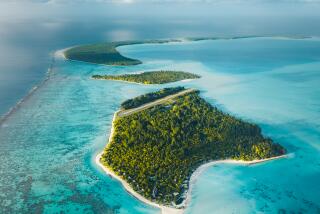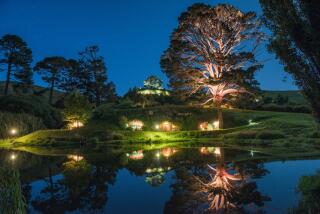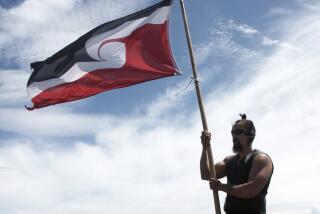New Zealand: a Majestic Nation Suffering From Pacific Isolation
WELLINGTON, NEW ZEALAND — The prime minister resigned this month for reasons of personal health and, perhaps, political disenchantment. New Zealand is in flux.
Yet the United States is not paying much attention and the newly appointed U.S. ambassador has not been confirmed.
Howls of outrage reverberated through this capital city when Seattle real-estate broker Della Newman, George Bush’s nominee, confessed not being sure where the country was. New Zealanders interpreted Bush’s choice as one more sign of a deteriorating U.S. relationship.
Newman led Bush’s presidential campaign in Washington state; her appointment follows the tradition of ambassadorships as a form of payoff. Certain of these appointments have worked out better than expected; this one is off to a terrible start.
Newman is now boning up on New Zealand before reappearing before a previously unimpressed Senate committee. One hopes she is studying hard. Politics in these islands are aboil after a half-decade of David R. Lange’s contentious, articulate leadership. And assignment to New Zealand is no mere “Call Me Madam” matter. Along with Australia, New Zealand holds the key to the South Pacific; without a proper relationship to this strategic and economic growth area in the early 21st Century, the United states will have deep trouble with what is the de facto eighth continent on the planet, Oceania.
On the map, Newman will discover that New Zealand consists of North and South islands, about 1,250 miles east of Australia. Encompassing 104,000 square miles, the country is about the same size as the United Kingdom, but with a tiny population of only 3.3 million. About 400,000 of them are Maoris, descendants of Polynesian seafarers who settled during the medieval and Renaissance eras of Europe.
If confirmed, Newman will discover one of the most beautiful, naturally blessed portions of the planet encompassing every possible environment: majestic mountains, spectacular lakes, white-water rivers, coastal fiords, fertile plains and a warm semitropical zone on the North Island.
With a great deal of dissension, Lange (pronounced Long-ee ) and his Labor government have been busy privatizing the New Zealand economy. It has not been easy. In the early decades of the 20th Century, New Zealand transformed itself into a social-welfare society even more protected than the Scandinavian kingdoms. Not only did government guarantee a wide array of womb-to-tomb benefits, it also moderated the economy down to minute detail. Government controlled the marketing of agricultural and meat exports to Britain, for which New Zealand served as granary and sheep farm. Government set retail prices in department stores, operated railroads, mines and the national bank.
Committed to an Anglican scheme of values, New Zealanders boasted about being more British than the British. Still, they effected a social-political system more encompassingly socialistic than any other in the Free World. New Zealand could adopt such a polity because it had a homogenous population of British descendants, a continuing market for its products and a genius for establishing lines of international credit.
Since there is virtually no established upper class in New Zealand, with the exception of a few descendants of the 19th-Century pastoral squirearchy whose political clout is zero, its Labor Party is not based upon class resentment as is the case in Britain and Australia. Thus the paradox of Lange, a Laborite, leading a Thatcherite revolution.
The Lange government moved New Zealand out of the railroad business and is selling off choice rail sites for development. A whole range of legislation is extricating government from control of agriculture, retail, import-export and other phases of the economy.
Thatcherizing takes its toll, however. Increased efficiency in the shipping industry has resulted in the elimination of 400 jobs. Reduction of the national police force by 267 full-time positions has produced outraged reaction in cities where the cuts are occuring. New Zealand is experiencing the highest level of unemployment in its history--a total of 145,653 out of work. An unemployment rate well below 5% may not seem alarming to Americans, but New Zealanders have traditionally felt entitled to jobs--if not from the private sector then from government.
No wonder the Labor Party had lost public favor just as Lange deputy Geoffrey Palmer assumed the prime ministership. As Britain’s Margaret Thatcher found out, it’s not easy to lead a privatizing revolution. Urged to act entrepreneurially, the publicly owned Bank of New Zealand racked up stunning losses in 1988-89, in bad loans at home and abroad. In the last 14 months, eight companies per day have been going belly up. Few economies in the world are experiencing such pullbacks and transformations.
Amid such stress, usual signs of social dislocation and misbehavior have surfaced. Unemployment has been especially tough on New Zealand’s Maori and South Pacific islander population, with the usual results. Nearly half of those serving prison sentences in New Zealand are young males from these two groups. Gang warfare between rival Maoris and Pacific islanders has erupted in the cities.
Racial prejudice does not characterize interaction between native islanders and Europeans, yet many lost jobs are Maori jobs. The Maori school dropout rate alarms educators. After a decade-plus of American-style affirmative action, there are more Maoris at the top--more doctors, lawyers and engineers--but the Maori bottom sector grows even more rapidly. This deeply disturbs a nation that takes its heritage very seriously.
The Maori legacy serves as a vehicle of self-identification for the entire culture. It provides the usable past for a nation in the process of transforming itself from a British dominion to a bicultural South Pacific Island nation. New Zealanders say “Ki Ora,” Maori for hello. Maori names dominate the landscape. When New Zealand met France in rugby at Christchurch in June, the home team performed a ritual Maori dance before the game, although most of the players are non-Maori.
Crime is not an exclusively Maori or islander prerogative. A prominent cricketer, Peter Plumley-Walker, was recently murdered after a sadomasochistic session lurid enough to satisfy the most kinky British tabloid. Alarmed by crime and the growing number of islanders on the dole, New Zealand has begun to restrict immigration from the South Pacific.
Until the 1970s, New Zealand stood psychologically--like one of those psychographic maps from the New Yorker--somewhere between England and Scotland. When Britain joined the European Economic Community in the early 1970s, however, and started to buy meat and dairy products from the continent, New Zealand was forced to recognize that it was no longer an outpost of empire, but a free-standing nation.
In terms of land mass, population and economy, Australia is the United States of the South Pacific. The region has become an Australian mare nostrum. Yet France has a nuclear presence in the Pacific and New Zealand wants to remain independent of both powers. Meanwhile, New Zealand’s alliance with the United States has collapsed because the Lange government refused to let American nuclear vessels call on island ports. New Zealand would like to see itself as the Switzerland of the South Pacific, prosperous, sophisticated, militarily disengaged, content to let the Australians do the necessary work of policing the region. With the collapse of the American alliance, New Zealand exists in a curious state of isolation, with all the attendant paranoia such isolation can bring.
The specific reason for the exclusion of American naval vessels--a ban on nuclear energy--cannot be trivialized. Just as New Zealanders of British origin have begun to embrace the Maori legacy, they have also begun to be transformed by the great islands they have settled. New Zealand poetry from the postwar era is filled with themes of the abiding permanence of nature before the arrival of the Europeans. Environment has now emerged as a symbol of vulnerability in the New Zealand imagination, just as it has in the United States.
No people feels the limits and possibilities of its environment more intensely than an island people. An argument can be made that the two islands of New Zealand constitute the most blessed environment on the globe--in beauty and natural resources. New Zealanders do not want to rush into an industrialism based on nuclear energy. From this perspective, New Zealand is a post-modern culture, developed but non-exploitative.
The next U.S. ambassador will be dealing with a society at once ancient and post-modernist. By defining its own way, New Zealand is, paradoxically, coming closer to, not farther from, the United States. Our nation, so vast in population and resources, is also pondering the values of environmentalism, proper economic order, cultural identity and social justice, the issues that New Zealanders address with characteristically understated passion.
More to Read
Sign up for Essential California
The most important California stories and recommendations in your inbox every morning.
You may occasionally receive promotional content from the Los Angeles Times.










